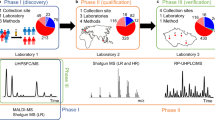Abstract
Breast cancer is the most common form of cancer among women. Compared with other serum polypeptides, autoantibodies have many appealing features as biomarkers including sensitivity, stability, and easy detection. Anti-lipid autoantibodies are routinely used in the diagnosis of autoimmune diseases, but their potential for cancer diagnosis has not been explored. Dysregulation of cellular signaling in cancer cells would be expected to lead to irregular metabolism of many lipids, which could be sensed by the immune system and cause the production of autoantibodies. Discovery of anti-lipid antibodies could be used as biomarkers for early breast cancer diagnosis. We describe here a more sensitive and accurate method for lipid microarray detection using dual fluorescent labeling, and used it to examine global anti-lipid profiles in the MMTV-Neu transgenic breast cancer model. We conclude that, at the current technology, lipid microarray is not a preferred method for anti-lipid antibody detection in breast cancer animal models. Our result will help the future application of lipid microarrays in identifying anti-lipid autoantibodies in breast cancer and other human diseases.




Similar content being viewed by others
References
Miller LD, Liu ET. Expression genomics in breast cancer research: microarrays at the crossroads of biology and medicine. Breast Cancer Res. 2007;9:206.
Abramovitz M, Leyland-Jones B. A systems approach to clinical oncology: focus on breast cancer. Proteome science. 2006;4:5.
Casiano CA, Mediavilla-Varela M, Tan EM. Tumor-associated antigen arrays for the serological diagnosis of cancer. Mol Cell Proteomics. 2006;5:1745–59.
Wang X, Yu J, Sreekumar A, Varambally S, Shen R, Giacherio D, et al. Autoantibody signatures in prostate cancer. N Engl J Med. 2005;353:1224–35.
Rubin MA, Zhou M, Dhanasekaran SM, Varambally S, Barrette TR, Sanda MG, et al. Alpha-methylacyl coenzyme a racemase as a tissue biomarker for prostate cancer. Jama. 2002;287:1662–70.
Zha S, Ferdinandusse S, Denis S, Wanders RJ, Ewing CM, Luo J, et al. Alpha-methylacyl-coa racemase as an androgen-independent growth modifier in prostate cancer. Cancer Res. 2003;63:7365–76.
Tomlins SA, Rubin MA, Chinnaiyan AM. Integrative biology of prostate cancer progression. Annu Rev Pathol Mech Dis. 2006;1:274–1.
Baron A, Migita T, Tang D, Loda M. Fatty acid synthase: a metabolic oncogene in prostate cancer? J Cell Biochem. 2004;91:47–53.
Rossi S, Graner E, Febbo P, Weinstein L, Bhattacharya N, Onody T, et al. Fatty acid synthase expression defines distinct molecular signatures in prostate cancer. Mol Cancer Res. 2003;1:707–15.
Glunde K, Ackerstaff E, Mori N, Jacobs MA, Bhujwalla ZM. Choline phospholipid metabolism in cancer: consequences for molecular pharmaceutical interventions. Mol Pharm. 2006;3:496–506.
Hammad LA, Wu G, Saleh MM, Klouckova I, Dobrolecki LE, Hickey RJ, et al. Elevated levels of hydroxylated phosphocholine lipids in the blood serum of breast cancer patients. Rapid Commun Mass Spectrom. 2009;23:863–76.
Kanter JL, Narayana S, Ho PP, Catz I, Warren KG, Sobel RA, et al. Lipid microarrays identify key mediators of autoimmune brain inflammation. Nat Med. 2006;12:138–43.
Guy CT, Webster MA, Schaller M, Parsons TJ, Cardiff RD, Muller WJ. Expression of the neu protooncogene in the mammary epithelium of transgenic mice induces metastatic disease. Proc Natl Acad Sci USA. 1992;89:10578–82.
Oresic M, Hanninen VA, Vidal-Puig A. Lipidomics: a new window to biomedical frontiers. Trends Biotechnol. 2008;26:647–52.
Schiavo N, Lottermann AL, Costa FP, Staub HL. Antiphospholipid antibodies, thrombosis, and adenocarcinoma. Clinics. 2005;60:257–8.
Langer F, Eifrig B, Marx G, Stork A, Hegewisch-Becker S, Hossfeld DK. Exacerbation of antiphospholipid antibody syndrome after treatment of localized cancer: a report of two cases. Ann Hematol. 2002;81:727–31.
Ravindranath MH, Muthugounder S, Presser N, Ye X, Brosman S, Morton DL. Endogenous immune response to gangliosides in patients with confined prostate cancer. Int J Cancer. 2005;116:368–77.
Smith KA, Gale BK, Conboy JC. Micropatterned fluid lipid bilayer arrays created using a continuous flow microspotter. Anal Chem. 2008;80:7980–7.
Acknowledgments
The authors thank Ms. Yue Zeng and Dr. Wenjuan Su for their help with mouse maintenance and blood collection. This work was supported by a concept award from the Department of Defense (DOD) Breast Cancer Research Program (W81XWH-06-1-0690) and a research grant from National Institutes of Health (GM071475).
Author information
Authors and Affiliations
Corresponding author
Additional information
Yoshiya Yonekubo and Ping Wu contributed equally to this work
Electronic supplementary material
Table S1
(DOC 174 kb)
Rights and permissions
About this article
Cite this article
Yonekubo, Y., Wu, P., Esechie, A. et al. Characterization of new serum biomarkers in breast cancer using lipid microarrays. Tumor Biol. 31, 181–187 (2010). https://doi.org/10.1007/s13277-010-0027-7
Received:
Accepted:
Published:
Issue Date:
DOI: https://doi.org/10.1007/s13277-010-0027-7




